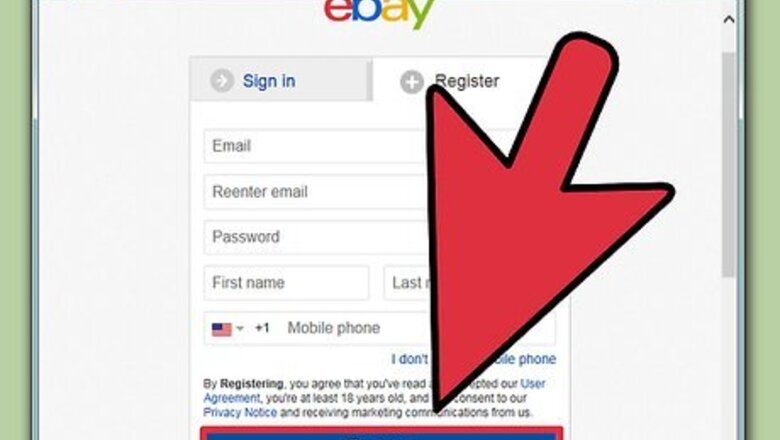
views
Getting Started

Create an eBay account. If you don't already have one, you'll need to go online and create an account on eBay. The account is free and allows you to operate as a seller or a buyer. Once you have an account, you can log in to My eBay and track your auctions, view bids and send and receive emails. Put some thought into the name you choose for your eBay user ID. This is how you'll be known in the eBay community. Pick something that's memorable but not weird, inoffensive and positive.

Look into fees. When you sell on eBay, you can operate under the standard fee arrangement or choose to become a subscriber. Among the differences are the number of free listing you get per month and the add-on fees you'll pay. As someone who's new to selling on eBay, you'll probably want to operate under the standard fee agreement. You'll pay no insertion fees on up to 50 listings per month and be charged a flat 10% final value fee when your item sells. There are three paid subscription accounts available on eBay. Each comes at a slightly different cost per month (from $15.95 to $179.95), a different number of no-insertion-fee listings per month (from 150 to 2,500) and final value fees that range from 4 percent to 9 percent.
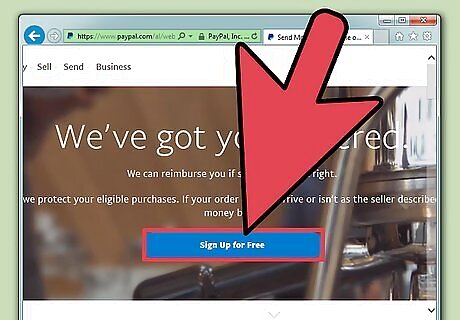
Open a PayPal Account. PayPal allows your buyers to use a credit card or a checking account to pay for the items they buy from you. It also allows you to sell internationally. Buyers initiate the payment transaction with PayPal, and PayPal, in turn, transfers the money to your account. It's not required that you have a PayPal account in order to sell on eBay, but it can be difficult to succeed without one. Almost 90% of eBay users have a PayPal account. There's a feature on eBay that allows users to search for auctions by checking a box that says “only show sellers who take PayPal.” It's a popular choice for people who don't want to be bothered with writing and mailing a check or using some other form of payment.
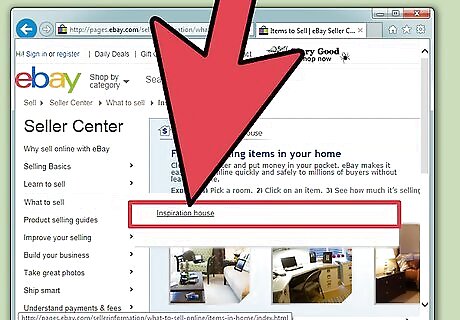
Decide what to sell. It's best to start by selling things that you already have around your home. Go room by room and look for things you no longer need or wear or perhaps have never even used. Ebay offers an online tool called "Selling Inspiration House." Use it to navigate through a sample home and click on items you could sell and see how much you might earn for everything from shoes to computers. It's also a good idea to look around on eBay to see what other people are selling and at what price. Check to see how many "bids" an item has to try to gauge its popularity. Sell what you know. Not only will you need to write a detailed description of your item, but potential buyers may contact you with questions. It can be difficult to thoroughly explain the benefits of a product and answer detailed inquiries if you're not all that familiar with the item yourself. Determine what sells well and look for more of it. Local garage or estate sales can be a good way to buy things inexpensively that might sell for more on eBay.
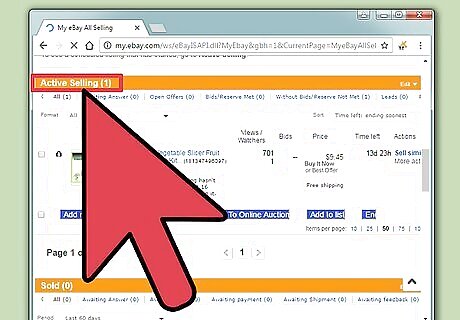
Start small. While your ultimate goal may be to become an eBay Power Seller, you want to take things one step at a time. Starting with just a few items to sell gives you the chance to learn the ropes and establish yourself as a reputable seller. Like any new enterprise, selling on eBay may present you with some unexpected challenges, and you're bound to make a few mistakes--everybody does. Begin by selling just a few items so you can familiarize yourself with the responsibilities that come with being a seller. To become a truly successful seller, you need to have lots of positive feedback. When you're first starting out, you won't have any. Build your business slowly and give great customer service so that you can earn positive feedback. That way, you'll earn the trust of buyers, who will be more likely to do business with you once they see you're an established and honest seller.
Creating Your Listing
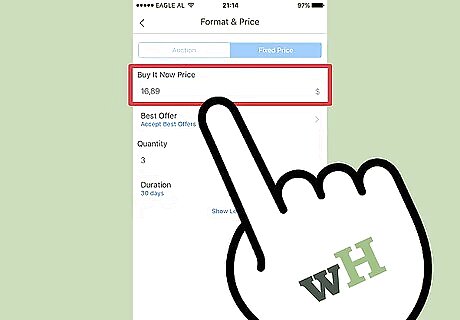
Choose how you want to sell. eBay originally functioned as an auction site only, but now you have other options when it comes to putting your items up for sale. Consider how quickly you want to sell your item, whether or not you'd be willing to let it go at lower price than you'd hoped for and how much effort you want to put into the whole selling process. Traditional auction. If you list your item auction-style, you establish an opening bid and then allow a set number of days for buyers to submit their own bids for your item. Whatever the highest bid is at the end of the auction period, that is the final selling price of your item. The hope, of course, is that interest will be high and the price will rise over the auction period so that you come out a winner. You can set an auction to last 3, 5, 7 or 10 days. Sellers with a feedback rating of 10, will also be given the option of a 1-day auction. Many buyers watch items for a while and think about them before placing a bid, so a longer auction could be to your advantage. This choice may not be a good one if you're faint of heart as you have to contend with the stress of watching and waiting to see if the selling price will go up and if you'll break even or ideally make a profit on your item. While it may bring a bit of unwanted drama to your life, using the traditional auction method could pay off. eBay says buyers are twice as likely to buy an item when it's listed auction-style. Reserve. If you want to ensure that an item you list for auction doesn't go for a price you can't live with, you can set a Reserve on the item. A Reserve is the minimum bid you must receive in order to sell your item. If you set a Reserve, be aware that interested buyers may be in touch to find out your Reserve amount, so you may be spending some additional time answering questions. eBay also charges a fee for adding a Reserve. Buy It Now (BIN). The BIN feature lets you set the price you want for an item right from the get-go. Buyers who look at your listing will immediately know the price, and they can purchase straight out. BIN gives you the opportunity to perhaps sell your item quickly for the price you want and be done with it or move on to your next listing. You can list for 3, 5, 7, 10 or 30 days or choose the "Good 'Til Cancelled" option for your Buy It Now listing. You can add a BIN option to an item you have listed for auction. Best Offer. You can add a Best Offer feature to a BIN listing. That way, interested buyers can submit to you a price they'd be willing to pay for your item. You do not have to accept any Best Offer bids that come in unless you want to. You can hold out to see if anyone will purchase your item at the BIN price.
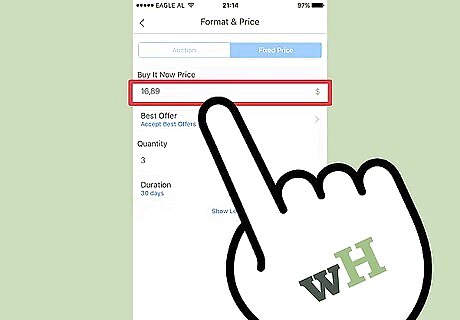
Decide on your price. The best way to price an item is to see what similar items have sold for on eBay. Log in to your eBay account and choose "Advanced Search" and check the box marked "Completed Listings" to see what items have sold for across multiple categories. Look at how the items were sold (auction, BIN, Best Offer or Reserve)and pay particular attention to those that used the selling method you've decided to use for your own item. It's important to look for items that are similar to yours in as many ways as possible. That means condition, age, color and a variety of variables should be taken into account when comparing your item to those that have recently sold. You can see information about items that have sold within the last 90 days and for items that didn't sell within the last 30 days. When determining how much to charge for your item, use an eBay profit calculator. It's important to do this so that you will factor in all the costs involved such as fees, shipping, packaging, cost of the item. An item may sell at a loss if calculations are not completed prior to setting a price.

Take photos. It won't be enough to simply talk about your item, you have to show buyers what you're offering. In fact, as of July 31, 2013 eBay requires at least one photo for each listing. Photos must be border-less, without seller-added text or artwork and be at least 500 pixels on the longest side. When taking photos of your items, keep your background as simple and clean as possible. Set them up against a white or neutral background. Try clipping a piece of white poster board to a stand and bending it onto a table to serve as a backdrop. If your item sparkles (it's a piece of jewelry, for example) place it on a black background instead. Don't use lighting that creates shadows, hot spots, reflections or gray areas. Avoid using the flash on your camera. Opt instead for soft, natural light or diffused light created by a lightbox or by putting a sheet, gauze or frosted glass in front of your light source. Put your camera on a tripod. No matter how steady you think you can hold your camera, you're better off setting it up on a tripod for taking photos; that's especially true for close-up shots. Blurred images won't show buyers what they want to see, and they'll quickly move on from your listing. Take multiple shots. Take not only a straight-on shot of your item, but photos from multiple angles as well. Be sure to include close-up photos of important details on your item. With the exception of cars, you can post 12 photos per listing for free.
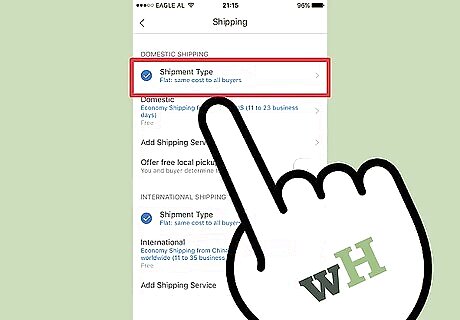
Determine how you'll ship. Once you've photographed your item, pack and weigh it so that you can arrive at an accurate shipping price. You can have shipping costs automatically calculated for you, double check the costs yourself or offer free shipping. You can choose "calculated shipping" when you list your item. When you do so, shipping costs will be automatically calculated for your buyer based on the buyer's ZIP code, the weight and the dimensions that you enter for the package. You can preview what shipping costs will be using eBay's Shipping Calculator. You'll enter detailed information about your package (weight, dimensions) your zip code and what shipping services (USPS, FedEx, UPS) you want to use. Offer free shipping. Free shipping allows you to attract more buyers and get higher placement in search results. Also, once a free-shipping transaction is confirmed, it'll earn you a 5-star rating on your "Shipping and Handling Charges Detailed Seller Rating."
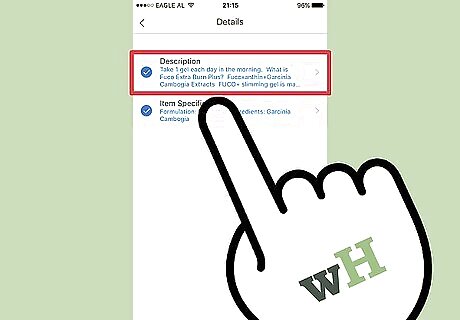
Write a description of your item. Writing a great description is really key to making money on eBay. You have to tell potential buyers as much as you can about your item and do it in a way that's clear and appealing. Create a clear title. Say what you're selling using appropriate keywords and adding any useful information that might catch a reader's attention (brand name, designer, color). Don't try to be cute or clever; instead, be clear as to exactly what the item is that's up for sale. Write all the pertinent information. Include the item's color, size, model names or numbers, if it comes with accessories, whether it’s new or used and if used, how old it is and what kind of condition it's in. Refer to the photos you've taken to write an accurate and complete description. Talk about benefits. It's not enough for potential buyers to know all the features of your item, they need to understand how those features can benefit them. For example, if the the boots you're selling are waterproof, be sure and say "your feet will stay warm and dry."
Completing the Transaction
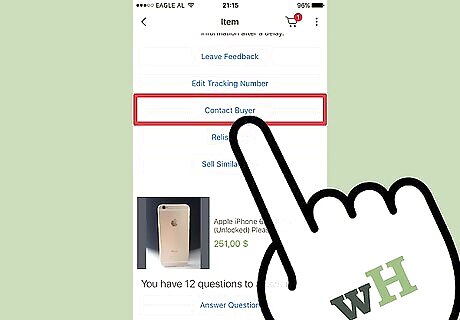
Contact your buyer. Once you've received a winning bid or a buyer has purchased your item, you need to be in touch. If you've chosen to use the online "Checkout" feature, some information will be sent to your buyer, or you can send an invoice via My eBay. Be sure to confirm the following information with the buyer: total price, tax (if applicable), accepted forms of payment, shipping cost, shipping method, expected delivery date and a tracking or Delivery Confirmation number.

Receive payment. Before you ship an item to a buyer, you have to receive payment. Buyers are typically good about paying on time--they know their reputation via feedback depends on it. In some cases, you may have to send a gentle reminder to a buyer who is slow to pay. If you fail to receive payment from a buyer, do your best to work it out between the two of you. If your efforts fail, you can go to eBay's Resolution Center and submit an "unpaid item case."
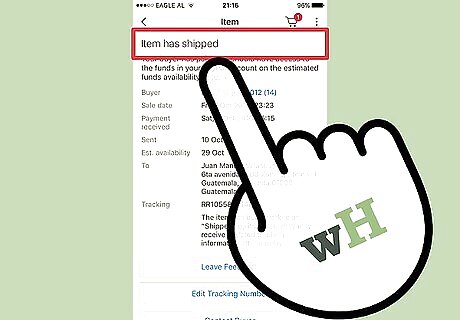
Ship the item. As soon as you receive payment, plan to ship out the item. Be sure it's securely wrapped and cushioned with enough packing material so that it'll arrive in good shape. Buyers are often eager to receive their items, so ship on time to ensure that your customer is satisfied and leaves positive feedback. eBay gives you the option of creating a shipping label and packing slip on its site. Get a provide your seller with a tracking or Delivery Confirmation number, doing so can protect you if a buyer claims they never received the item. If you created a shipping label on eBay, the tracking or Delivery Confirmation number is available to you and the buyer in My eBay.
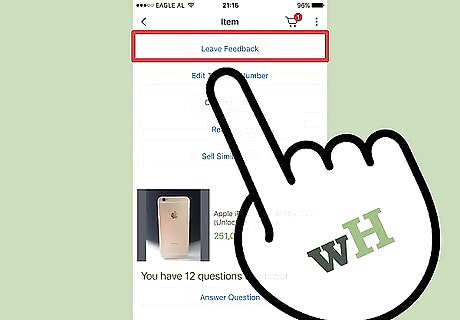
Leave feedback. It's not just buyers who leave feedback about their sellers, sellers, too, should leave feedback. This lets others know what it was like to do business with your buyer, helps your buyer improve his reputation (provided it was a good experience) and earns you a reputation as a thoughtful and appreciative seller.
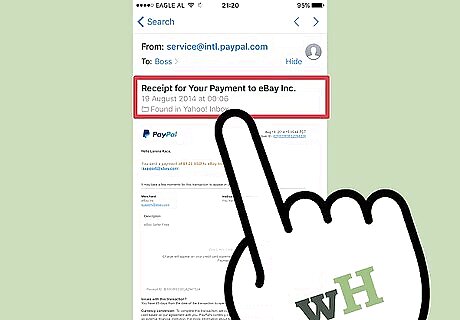
Pay your eBay fees. The sale price of your item along with any add-ons (gallery photos, Reserve, etc.) will determine what fees you must pass on to eBay. Be sure to make your payments in a timely fashion to establish yourself as a trustworthy seller.
Growing Your Business
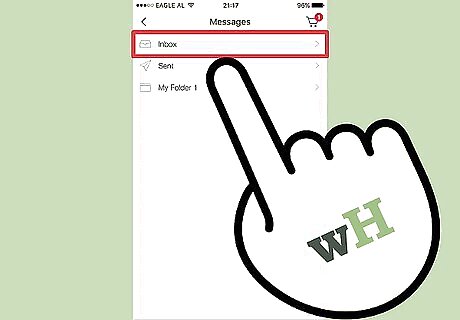
Be a great communicator. Being responsive to interested buyers and your customers is important in any sales situation, but perhaps even more so on eBay where auctions can move quickly and people must rely only on email as a way of being in touch. Check your email frequently so that you can give prompt responses to questions about your items or inquiries regarding payment or shipping. Considering downloading the eBay app to your smartphone so that you can manage your communications more easily. Be friendly in your emails. It's always a good policy to treat people with courtesy. On eBay that can earn you repeat customers and great feedback.
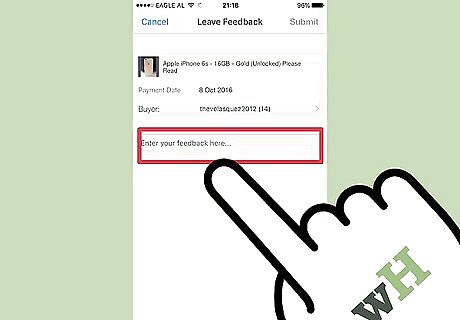
Give timely feedback. You have the opportunity after every transaction to give feedback about your buyer. Do it. And do it in a timely way. eBay success is built on reputations. Be generous and quick in giving feedback in the hopes that your buyers will do the same for you. Don't withhold feedback--waiting for comments from buyers first before you post feedback about them; you'll seem petty. Unless a transaction was particularly horrific, come up with something positive to say to your buyer. Even a simple "Thank you for your business" is better than not leaving any feedback at all.

Go wholesale. You can purchase small wholesale lots of products that most people use on a daily basis and make those the focus of your eBay business. There are a lot of products that fit this description. Do you want to sell clothing or home decoration, beauty supplies or kitchen items? Make a decision, do some research on your market and learn how to target buyers and meet their needs.
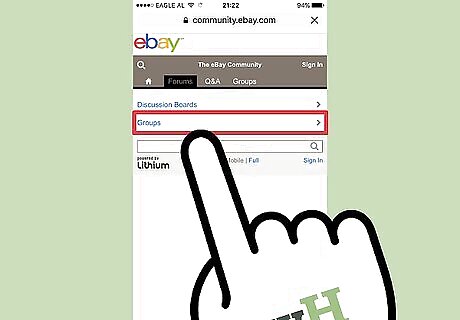
Find a niche. One of the most common reasons buyers turn to eBay is to find unusual items that they can't find anywhere else. Browse through eBay's community groups to see all the folks who share common interests (stamp collectors,knitters, stay-at-home moms, vegans, etc.) and sell items that appeal to their specific needs and desires.
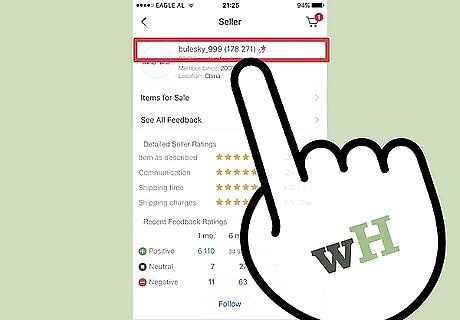
Become a Power Seller. Power Sellers represent an elite 4 percent of eBay sellers. A Power Seller designation tells buyers that you are trustworthy, honest and offer a fair deal, which in turn brings more buyers your way. Not only that, Power Sellers enjoy a number of advantages and benefits and special access from eBay. Depending on their level, these can include priority customer and technical support, discounts from UPS and even health insurance. Power Seller must meet a list of eligibility requirements. Be an active member for 90 days. Average a minimum of $1000 in sales per month for three consecutive months. Maintain a minimum of four average monthly listings for three consecutive months. Have an overall feedback rating of 100, of which 98% or more is positive. Have an account in good financial standing. Uphold the eBay community values, including honesty, timeliness and mutual respect Comply with all eBay listing and marketplace policies.















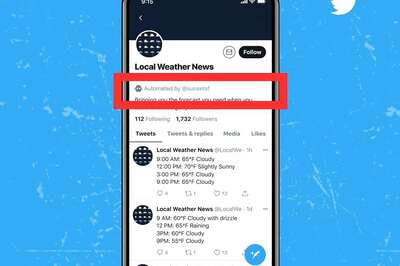




Comments
0 comment